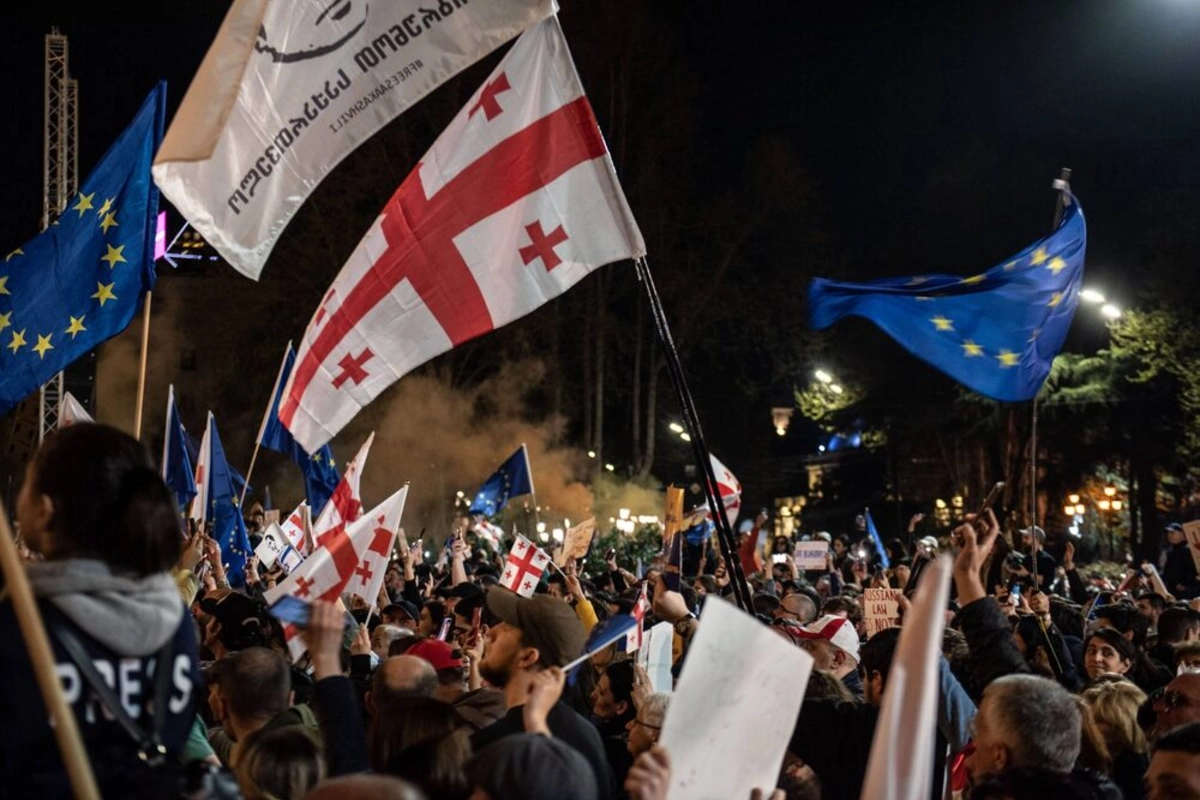
The Georgian Parliament’s Legal Affairs Committee has greenlit the controversial foreign agent bill, amidst chaos in parliament and protests outside.
Tens of thousands gathered to protest the law. Image: Mariam Nikuradze/OC Media.
(OC Media) The Committee finally voted to advance the bill late on Monday night, as tens of thousands of protesters gathered outside parliament.
Protests began from early morning with several hundred people, growing to tens of thousands by evening. While riot police cordoned off the sides of parliament and had water cannons and sonic weapons on standby, the protests remained largely peaceful.
Riot police prevented protesters from approaching the entrances to parliament on Monday evening. Photo: Mariam Nikuradze/OC Media.
Georgian Dream announced they were bringing the bill back on 3 April, a year after being forced to drop it amidst mass street protests. At the time, the government promised not to revive the law.
On Monday night, the Ministry of Internal Affairs reported that one police officer was injured during the protests and that 14 protesters were detained.
The debates in the committee hearing saw chaotic scenes.
At one stage, Aleko Elisashvili, the leader of the opposition Citizens Party, punched Georgian Dream’s parliamentary leader, Mamuka Mdinaradze in the face. He was then set upon and beaten by a group of Georgian Deam MPs, before being ejected by parliament guards. Parliament immediately shut down its stream of the committee session after the incident.
After leaving parliament, Elisashvili was greeted with cheers and hugs from protesters outside.
Throughout the session, at least nine opposition MPs, including Levan Khabeishvili, the chair of the opposition United National Movement, were ejected from the committee session. The head of the committee, Anri Okhanashvili, also repeatedly cut off the microphones of opposition MPs for being ‘disruptive’ or for calling the bill a ‘Russian law’.
On Sunday, Speaker of the Parliament Shalva Papuashvili issued a statement barring online media outlets including OC Media from entering parliament to cover the committee hearings.
The law has seen widespread condemnation from local and international rights groups and from Western countries and institutions.
On Monday, the Ambassadors of the EU, US, and UK met with Prime Minister Irakli Kobakhidze to discuss the law. They did not provide details of the conversation.
Hundreds of protesters brought the flag of Europe to the demonstration. The EU has made clear the law’s passage could undermine Georgia’s membership bid. Image: Mariam Nikuradze/OC Media.
Georgia’s foreign agent law, dubbed by protesters the ‘Russian law’, would label any civil society or media organisation that received at least 20% of its funding from outside Georgia ‘organisations carrying out the interests of a foreign power’. Such organisations would be subject to ‘monitoring’ by the Ministry of Justice every six months, which lawyers have warned could include forcing them to hand over internal communications and confidential sources. Organisations that do not comply would be subject to large fines.
The law has been dubbed the ‘Russian Law’ by critics in Georgia due to its similarity to legislation used to crush civil society and independent media in Russia.
Share on social media